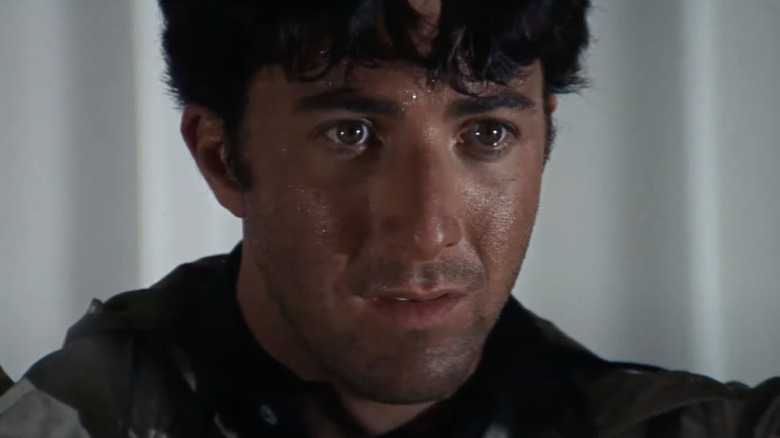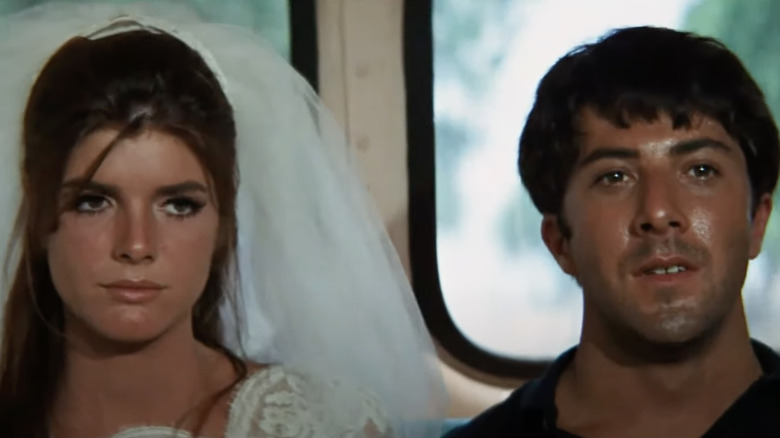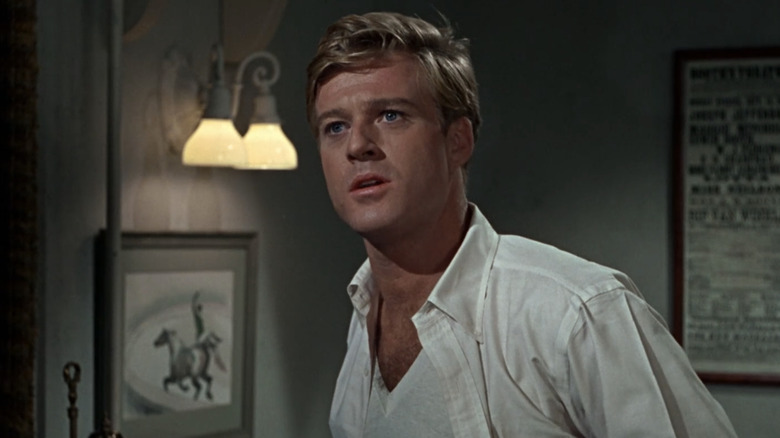
Why Dustin Hoffman Didn’t Think He’d Get His Role In The Graduate
Share

Dustin Hoffman had never been the lead of a film before "The Graduate." Hollywood is always wary about casting relatively unknown performers to be first on the call sheet of motion pictures, even if they have had tremendous success on stage or on television. Of course, the trouble with not casting unproven leads in films is it becomes enormously challenging to actually create new bankable stars. You can't be the lead of a film unless you've been one, but how can you be one unless someone gives you the opportunity? It's a vicious cycle.
Enter Mike Nichols, who is now rightfully regarded as a masterful filmmaker, particularly in his ability to get exceptional performances out of his actors from "Who's Afraid of Virginia Woolf?" to "Carnal Knowledge" to "Closer." "The Graduate" was only Nichols' second film as a director, but he was already a big name by this point. He had an enormously successful comedic partnership with Elaine May, become a big shot director on Broadway, and had directed the lauded film adaptation of "Who's Afraid of Virginia Woolf?" He already had quite a lot of leeway to be able to do what he wanted when it came to making movies, which included casting. Dustin Hoffman was nobody's first choice for the role of Benjamin Braddock, but he ended up being the perfect person to portray the recent college graduate caught up in a romantic triangle between an older woman (Anne Bancroft) and her daughter (Katharine Ross). Naturally, the role shot him to the A-list, and he became a go-to leading man from then on out. However, Hoffman thought he blew his shot at nabbing his first lead due to what he felt was a disastrous screen test.
Nerves Can Kill You

More often than not, auditioning can prove incredibly stressful for an actor. You could be brought back in to audition over and over and over again to the point that the process seems futile. Plus, the more you keep coming in for a certain role, the higher your hopes become of actually getting the part. For projects that have the resources, actors far into the process will take part in a screen test, which basically serves to mimic the circumstances of doing the part without actually doing it. You work on a set, alongside a crew and other actors, and if you make it this far, you have a strong shot of earning the role.
Fortuitously, Dustin Hoffman worked opposite Katharine Ross in his screen test, who would also go on to get the part she was up for. In hindsight, the circumstances could not have been better for him to easily grab this part. Nerves, however, do not care about whatever circumstance you're in, and they will come out and attack. In an interview with the Criterion Collection, Hoffman recounts of his screen test:
"Mike [Nichols] wants to do this, I learned later, in a master shot. I couldn't have told you what a master shot was ... and he wants to do 10 pages all in one take and moving the camera. So maybe he's just working out himself, or he's trying to see, you know, can this guy, who's basically just barely been on the stage, can he do movies? Can he, you know, work under these conditions? It's not a few lines and then cut. And Katharine and I both kept screwing up. We were both violently nervous ... They wanted it word for word, and if we left one word out, or they said, 'That's not a period. That's three dots.' I mean, it was strict. Fine, but we weren't getting it."
I can't think of a better way to hold an actor's feet to the fire than having them do 10 pages in one take. As a rule of thumb, a page in a screenplay equates to about a minute on screen. So, a ten minute unbroken take is a lot to take in, especially if you have to be word perfect. Thankfully for Hoffman, he was in the hands of Mike Nichols, someone who could really calm him down and assure him that everything was going to be okay.
"Mike takes me aside after, god knows, the 10th take or whatever, and I go to talk to him, and I think, 'Oh, I hope he's going to tell me, 'Thank you. Just go back to New York.' But he says, 'You know, you seem so nervous, so ill at ease.' I said, 'I am ... I really am. I told you I don't think I'm right, and I, you know, don't know the lines that well. I couldn't learn them fast enough.' And I remember he said, 'Just relax ... The curtain's not going to open. There's no audience. It's not the movie that's going to come out. It's a screen test. We may not even print most of this stuff when we put together the scene. There's no need for any pressure.'"
To put a wonderful cherry on top of the moment, though, Nichols let it slip just how nervous he was about the whole thing, too.
"[Nichols] put his hand out to shake my hand. And I shook his hand, and his hand was so sweaty it slipped out of mine because he was that nervous."
Look, I have been crushingly nervous for many things in my life, often with very sweaty palms. They've never been so drenched that they would slip out of someone else's grip. I am glad Hoffman and Nichols could find a kindred spirit in their anxiety.
Hoffman Was Not The First Choice

When "The Graduate" was first getting off the ground, producer Lawrence Turman wanted to pick a hot, young star to play Benjamin Braddock. According to the fantastic "The Making of 'The Graduate'" piece from Vanity Fair, Turman's list of potential Benjamins consisted of "Warren Beatty, Steve McQueen, Bob Redford, [George] Peppard, George Hamilton, Tony Perkins, Keir Dullea, Brandon De Wilde, [and] Michael Parks." Robert Redford was really the main choice for the part. He had just worked with Mike Nichols on Broadway in "Barefoot in the Park," and Redford would star in the film adaptation of the play the same year as "The Graduate." Redford even screen tested with Candice Bergen in the part Katharine Ross ended up getting. Also, let's be real, few people have ever been sexier in the history of humans than Robert Redford. You put him on your poster, especially in 1967, and you get some people to turn their heads. Ironically, it is exactly that reason why he would have been a terrible Benjamin Braddock. Mike Nichols, speaking about casting the film at a screening in 2003, told one of the greatest Hollywood stories of all time about Redford wanting to be in "The Graduate," which is recounted in the Vanity Fair piece:
"I said, 'You can't play it. You can never play a loser.' And Redford said, 'What do you mean? Of course I can play a loser.' And I said, 'O.K., have you ever struck out with a girl?' and he said, 'What do you mean?' And he wasn't joking."
That tells you everything you need to know, doesn't it? Robert Redford could literally be with any woman he wanted, and that completely disqualified him from this part. It's the one time being hot worked against someone. What makes that even funnier is that nine years later, Redford and Dustin Hoffman would work together in the journalism film masterpiece "All the President's Men," and in that movie, Hoffman is the one playing the ladies' man. Robert Redford landed on his feet, though. After making "Barefoot in the Park," his next film was "Butch Cassidy and the Sundance Kid," putting him in exactly the right part to propel him to superstardom, right alongside Hoffman.
Read this next: The 14 Best Film Acting Debuts Of All Time
The post Why Dustin Hoffman Didn't Think He'd Get His Role in The Graduate appeared first on /Film.